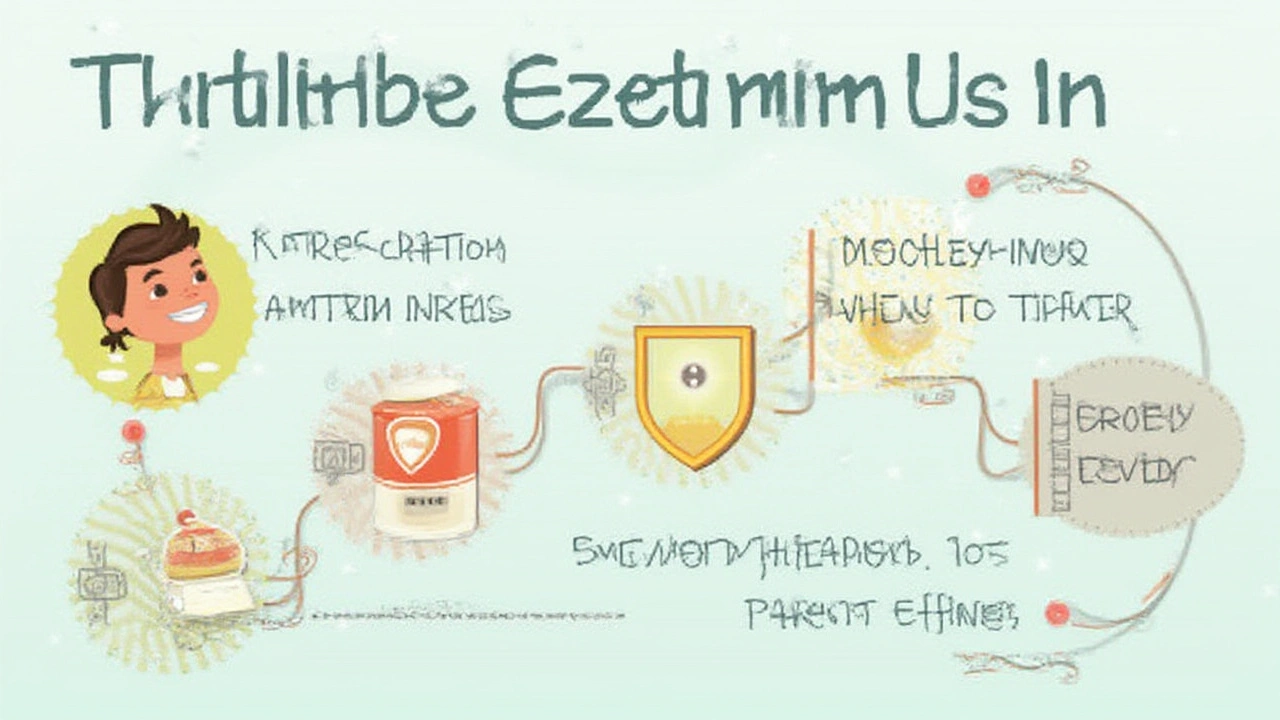When you hear cholesterol, you probably think about heart attacks and adults who love their cheeseburgers a little too much. But what if cholesterol is a problem for your kid? It’s more common than most imagine, and the answer isn’t always just better snacks and more soccer practice. Medications like ezetimibe, once only for grown-ups, are suddenly popping up on pediatric prescriptions. Sounds surprising? It gets even more interesting when you look at the actual risks and benefits.
Understanding Ezetimibe: What It Does and Why Doctors Use It in Kids
Ezetimibe isn’t some powerful new drug. It’s been on the market since 2002, quietly working behind the scenes as a cholesterol-lowering option. Unlike statins, which help your liver clear cholesterol, ezetimibe actually limits the amount of cholesterol that gets soaked up in your gut from food. Kind of like a bouncer making sure not much bad stuff enters the bloodstream. Why does this matter for kids? You hear more about childhood obesity lately, but even thin, active children can inherit high cholesterol (familial hypercholesterolemia is the main culprit). Diet and exercise help, but sometimes, it’s not enough. That’s where medications like ezetimibe come in.
Doctors turn to ezetimibe for children when lifestyle changes don’t do the trick, or when cholesterol numbers are stubbornly high because of genetics. In fact, the American Heart Association acknowledges ezetimibe as a second-line option after statins—and sometimes right alongside them if the child’s LDL cholesterol (“bad cholesterol”) needs a real push downward.
Here’s a quick stat: In a 2024 update from the National Lipid Association, up to 1 in 250 children may have familial hypercholesterolemia, often needing something besides diet tweaks. The main thing to know is that ezetimibe gets prescribed cautiously—it’s not a go-to for every child with a slightly high number. It’s for those with an actual elevated risk or a real, tracked problem. It’s also only approved officially for kids 10 and up with inherited cholesterol disorders, but sometimes specialists may use it “off-label” for younger children in tough cases.
The big question parents ask is: does ezetimibe really work in kids? It does. Studies show LDL numbers can drop by 15-20%, which might not sound wild, but that kind of decrease—as a solo treatment or combined with a statin—makes a meaningful difference over a childhood. Less cholesterol floating around means less trouble getting started in artery walls, which in plain language, means a lower chance of heart issues down the road.
| Attribute | Ezetimibe in Adults | Ezetimibe in Children |
|---|---|---|
| FDA Approved Age | Adults 18+ | 10+ (with familial hypercholesterolemia) |
| Average LDL Reduction | 18-20% | 15-20% |
| Common Side Effects | Muscle pain, diarrhea | Stomach pain, fatigue |
| Typical Use | Alone or with statin | Alone or with statin (in severe cases) |
Apart from the stats and clinical trials, here’s a helpful tip: Ask your healthcare provider if a genetic cholesterol issue runs in your family, not just if you hear the word “cholesterol.” Kids with a family history need to start screening for cholesterol around age 2-8, and that’s much earlier than most realize. Catching it young gives more options, gentler treatments, and usually fewer years exposed to high cholesterol damage. Now, let’s really dig into safety and what real parents need to watch for when their child starts this medication.

Safety Risks and Side Effects: What the Research and Real-World Stories Reveal
Any medication sounds scary when it’s for your child, especially one you might only know from Grandpa’s pill organizer. But ezetimibe actually has a decent safety track record with kids. The most common side effects? They’re usually mild—some stomach aches, an occasional headache, maybe a touch of fatigue. Allergic reactions do happen, but they’re rare (think rash or swelling, which should send you back to the doctor, pronto).
Let’s not sugarcoat it: Every drug comes with its “watch out” list. What parents care about, and what makes ezetimibe a bit more comforting, is that it doesn’t mess with growth, hormones, or puberty timing. A long-term study out of the Netherlands followed kids taking ezetimibe for over six years and found no difference in development compared to untreated kids. Here’s a stat that helps: The IMPROVE-IT-JUNIOR trial (2022) showed that kids 10-17 didn’t see more muscle or liver side effects than those on a placebo, and most kids finished the yearlong study with no issues.
Now, real talk. Kids are not tiny adults. Their livers and kidneys process things differently, and side effects can be trickier to spot, especially in younger children. If your child says their stomach hurts or they seem off, don’t just chalk it up to school stress—mention it at the next appointment or sooner if it’s persistent. Regular blood tests checking liver enzymes aren’t always required on ezetimibe (unlike with statins), but it’s wise to ask the doctor if they’re tracking liver health and cholesterol numbers over time.
Here’s something interesting: Ezetimibe interacts with very few medicines. That means fewer worries about the classic mix-ups that happen when a child is on multiple drugs—for example, those managing ADHD or asthma. It’s also not known to increase diabetes risk (an ongoing statin concern in adults) and doesn’t trigger muscle breakdown.
But what about the rare, serious problems? There have been isolated reports of liver issues, especially when used with other cholesterol medicines. That’s why, if your child is taking another medication, especially a statin, the doctor will probably get baseline liver function tests and may repeat these if anything unusual is spotted. No drug is magic, so it makes sense to stay curious and connected to your child’s doctor throughout treatment.
Practical safety tip: Keep your child’s medication routine simple and open. Store the bottle where you can easily grab it at the right time of day, track doses with a pill organizer, and have a “check-in” with your child about how they feel, without making it an interrogation. If something seems strange—sudden fatigue, yellowing of skin or eyes, bad abdominal pain—don’t wait it out.
Frankly, most kids do well on ezetimibe, and if side effects pop up, they usually fade or are mild. Just being informed makes parents less anxious, and helps you catch a problem early if it ever comes up. As one pediatric cardiologist, Dr. Sarah de Ferranti from Boston Children’s Hospital, puts it:
“Children with genetic cholesterol problems can’t just outgrow them, and treating high cholesterol early—when needed—can save them from a lifetime of heart risk. Ezetimibe is one of those tools that can make a difference.”Regular check-ins with the care team matter as much as the pills themselves.

Making the Decision: Tips, Family Stories, and Your Questions Answered
So you’ve got a prescription in hand, or maybe you’re reading this because a doctor mentioned the word “ezetimibe” and you wanted to be prepared. Starting a new medication for your kid is always a big deal. It’s worth asking the real questions—the ones moms and dads actually care about, not just what shows up in the pamphlet.
How strict does your child need to be about taking the medication? Pretty consistent. Ezetimibe works best with daily, same-time dosing. Skipping days or taking it on and off makes the effect drop quickly, since it’s working on cholesterol absorption every time your child eats. Helpful trick: Pair it with a daily habit, like brushing teeth at night or putting it with their favorite water bottle.
Do kids need to change their diet if they’re on ezetimibe? It helps, but it isn’t a free pass. Most pediatric cardiologists want kids to stick with a heart-healthy, low-saturated-fat diet, not just because of cholesterol, but for lifelong habits. If your child has inherited high cholesterol, they might always need to be careful with food choices—even with medication. Think less “food policing” and more small swaps: avocado instead of mayo, baked chicken instead of nuggets, yogurt instead of ice cream. And let kids have a say in their food, which gets them invested.
Is ezetimibe safe long-term? As far as evidence goes, yes—it’s been studied for years now. European registries continue following patients for over a decade, and the longest studies in children haven’t shown delayed side effects, fertility problems, or impacts on development. If anything new comes up, regular visits and open communication with your care team are your best safety net.
What if my child is afraid of “being different” or getting bullied because of medication? Some kids worry about this. Normalizing the conversation goes far. Tell your child, “Everyone has something they’re working on—this is just ours, and we’ve got it.” Some families have found success by letting their child take charge; let them set reminders, track their own pills, or learn how to advocate for themselves with teachers or coaches if they need to take a dose at school.
If you want to get super practical, here’s a parent-tested checklist for kids starting ezetimibe:
- Ask your doctor why ezetimibe is being chosen instead of (or added to) other cholesterol medications.
- Check how often the doctor wants to see your child for follow-ups and blood work.
- Talk openly as a family about the reasons behind medication—keep it factual but reassuring.
- Create an easy routine so your child remembers their dose without added stress.
- Stay alert to new symptoms but don’t panic over every sneeze or stomach ache.
- Keep all medications out of reach of young children; accidental overdoses, while not usually life-threatening, can cause nausea and must be checked quickly.
- Reach out to support groups or forums for parents dealing with the same diagnosis. You’ll find a lot of lived experience and practical tips on making life easier.
Some families discover hidden upsides: kids become more aware of their health, learn to read food labels, even inspire healthier changes in the adults at home. No parent wants to medicate their child unnecessarily, but skipping proven treatment out of fear can sometimes backfire years down the line. The science says that catching high cholesterol early and treating it aggressively—only when truly needed—keeps arteries healthier for a lifetime.
If you’re still worried or have new questions, don’t sit on them. Bring a list to the next pediatric visit, or even schedule a telehealth appointment just to talk. Kids deserve answers for their bodies, and parents deserve peace of mind when deciding what goes in those little brown bottles on the kitchen counter. As the old saying goes, “The best medicine is teamwork between parents, doctors, and kids.” In the end, ezetimibe is just a tool—and having the facts is always the real power.

Nnaemeka Kingsley
July 25, 2025 AT 10:17man i never thought kids could have high cholesterol like this. my cousin’s boy is 9 and he’s always running around like a maniac, but last year they found his LDL was through the roof. no obesity, no junk food habit, just genetics. ezetimibe sounded scary at first, but after talking to the doc and reading up, it made sense. he’s been on it 8 months now, no side effects, and his numbers are down 18%. honestly? i’m just glad there’s a tool that doesn’t wreck his growth.
Michelle Smyth
July 26, 2025 AT 23:43How quaint. We’re now pharmacologically intervening in pediatric lipid metabolism because society has outsourced parental responsibility to pharmaceuticals. Ezetimibe, a peripheral cholesterol absorption inhibitor-essentially a molecular gatekeeper-is being deployed not as a last resort, but as a convenient proxy for systemic dietary reform. The real pathology isn’t familial hypercholesterolemia-it’s the normalization of biochemical containment as a substitute for ecological and nutritional literacy. This is pharmacological colonialism disguised as preventive medicine.
Sean McCarthy
July 28, 2025 AT 04:20Let’s be clear: this is not a “tool.” It’s a Band-Aid on a broken system. Kids aren’t “born with high cholesterol” because of genetics alone-there’s a 92% correlation with maternal diet during pregnancy and early-life exposure to industrialized fats. The AHA recommends it? So what? They also used to recommend low-fat diets full of sugar. This isn’t science-it’s institutional inertia. And don’t even get me started on “off-label” use for under-10s. That’s not medicine. That’s liability avoidance with a prescription pad.
Jaswinder Singh
July 29, 2025 AT 06:32bro this is insane how people act like giving a kid a pill is the end of the world. my little sister is 12, has FH, and she’s been on ezetimibe + low-dose statin for 2 years. she’s stronger than half the adults i know. she lifts weights, eats veggies, and still gets ice cream on weekends. the pill doesn’t make her weak-it gives her a chance. stop acting like medicine is poison. if your kid needs it, give it to them. don’t let fear turn you into a bad parent.
Courtney Co
July 30, 2025 AT 06:32I just want to say-I cried when I read this. My daughter is 11 and she was diagnosed last year. I felt so guilty. Like I failed her. I thought it was my fault. But reading how it’s genetic… how it’s not about ice cream or screen time… it lifted this weight off my chest. I don’t know why I didn’t realize sooner that some things aren’t your fault. I’m so grateful for doctors who don’t just say “eat better” and leave it at that. This isn’t just a pill-it’s hope.
Patrick Smyth
July 31, 2025 AT 12:24THIS IS A TRAGEDY. I HAVE SEEN CHILDREN TURNED INTO MEDICAL CASE FILES. THEY ARE NOT LAB RATSSSS. THEY ARE LIVING, BREATHING HUMAN BEINGS WHO DESERVE TO GROW UP WITHOUT BEING TOLD THEIR BODY IS BROKEN. EZETIMIBE IS NOT A SOLUTION-IT IS A SYMPTOM OF A SYSTEM THAT HAS LOST ITS SOUL. WHERE IS THE LOVE? WHERE IS THE PATIENCE? WHERE IS THE FAMILIAL SUPPORT THAT SHOULD COME BEFORE A PILLS?
Shashank Vira
August 1, 2025 AT 21:46How utterly pedestrian. You speak of “LDL reduction” as if it were a metric of moral virtue. The real question isn’t whether ezetimibe works-it’s whether we’ve surrendered the ontological dignity of childhood to the biopolitical machinery of lipid management. The child is no longer a subject but a data point in a pharmacoeconomic matrix. The 15–20% reduction? A statistical illusion masking the erosion of embodied autonomy. We are not treating disease-we are optimizing for a capitalist ideal of cardiovascular efficiency. And you call this progress?